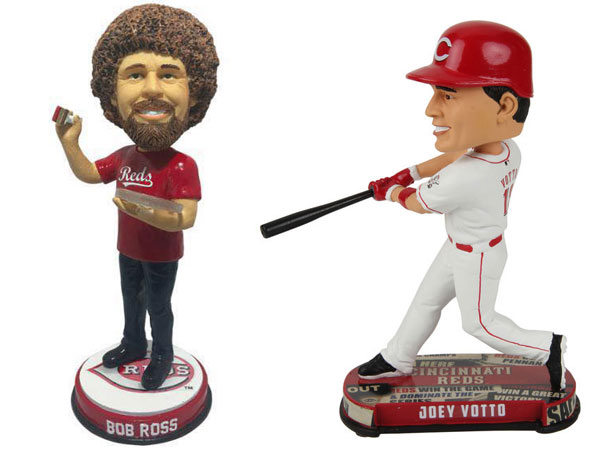November 27, 2018
Cincinnati Reds Prevail In 'Bobblehead Tax' Court Case
The ruling in favor of the professional baseball team has implications for the promo industry.
The Cincinnati Reds finished in last place in their division this past season, but the Major League Baseball franchise came out on top in a court case that has potential importance for the promotional products industry.
On Nov. 21, the Ohio Supreme Court ruled 5-2 that the Reds are exempt from paying taxes on bobbleheads and other promo products the team offered with ticket purchases for select games.

The Reds’ bobblehead offerings this past season included a co-brand with Bob Ross (a left), the late artist/television personality who taught painting on his show The Joy of Painting, and Reds’ star Joey Votto (at right).
The Ohio Department of Taxation wanted the team to pay $88,000 in taxes tied to Reds-branded merchandise provided to fans on game days between 2008 and 2010. Counsel for the department argued that the Reds should be on the hook for the taxes because the team buys and gives away the swag, rather than selling it with tickets.
The Reds fired back that they’re exempt from the tax because the bobbleheads and other merch are resold as part of a ticket purchase. In Ohio, law excuses companies from paying tax on products they buy to resell.
A majority of the court’s justices agreed with the Reds. Writing for that majority, Justice Patrick Fischer – a Cincinnati resident, according to press reports – said that bobblehead/promo item games are marketed and advertised so fans purchase tickets for them with the understanding that they are buying not just a seat at the game, but also the premium.
"We accordingly conclude that the promotion items constituted things of value in exchange for which fans paid money that was included in the ticket prices," Fischer stated in the opinion. As such, the Reds were deemed not liable for the tax.
While the court cautioned that the ruling is specific to the Reds case and wouldn’t necessarily apply to other organizations, you better believe defense lawyers will view it as an important precedent for future game day promo tax cases in the Buckeye State – and potentially beyond where similar laws are on the books. If for nothing else, the argument the Reds’ lawyers made helps show teams/companies a legal path they can follow to prevail if state officials come knocking for tax money on game day premiums.
Ultimately, the Reds victory is a good thing for the promotional products industry as, in the abstract, it absolves an end-client from paying an additional expense on goods distributors sell. If the Reds were found liable for the tax, could they have reduced investment in merch-with-ticket packages? Perhaps. Had the Reds lost, would other teams and organizations have taken note and sought to reduce investment in game day promos? Maybe. We’ll be Captain Obvious here and simply state: That wouldn’t be a good thing for promo distributors.
Interestingly, other state courts have issued decisions on cases involving taxes on game day giveaways. The Kansas City Royals successfully fought to have a decision requiring them to pay state sales and use tax overturned. The Milwaukee Brewers and Minnesota Twins ended up having to pay taxes on their promo products. The disparity of results can be down, in part, to differences in law from state-to-state, but arguments made in one state can potentially be useful to lawyers battling cases on behalf of their clients, regardless of where they are in the U.S.
In supporting the argument that the Reds provided bobbleheads and other merch as freebies to increase attendance, Ohio tax officials argued that the ticket price for each particular seat is the same throughout the season, whether a promo item is offered or not. Furthermore, not all patrons are guaranteed that they will get promo merch for a game in which it’s advertised because supplies are limited. Justice Mary DeGenaro echoed such points in her dissenting opinion. “Every ticket purchaser at every game helped pay for promotional items regardless of whether a promotional item was received—or was even offered—at a particular game, and that circumstance breaks the link between the payment of the ticket price and the offer of a promotional item,” DeGenaro held.
At the end of the day, though, Fischer and four other justices didn’t see it that way, which allowed the Reds to do something they didn’t do much of in 2018: Win.